November 8, 2023 by Edward Stephens, Jake Thorne and Patrick Stegemoeller in Awards with 0 comments
Ultiworld is pleased to announce our annual Club Awards, starting with the Club Player of the Year in each division. While we consider both regular season and postseason performance, because of the nature of the Club division, we weight success in the Series and at Nationals above all else. The Club Awards are voted on by Ultiworld reporters, contributors, and editors.
Our All-Club teams recognize the top performers across the division. Our First Team and Second Team display the top seven and next seven players who had the best seasons. As our voting process is ordered, the top vote-getters for All-Club honors function as the ordered list in our Player of the Year voting — our highest individual award.
Player of the Year Award
All-Club First Team
All-Club Second Team
Defensive Player of the Year Award
Offensive Player of the Year Award
Breakout Player of the Year Award
Coach(es) of the Year Award
Club Awards Voting Breakdown
Snubs and Superlatives
2023 Men’s All-Club Second Team
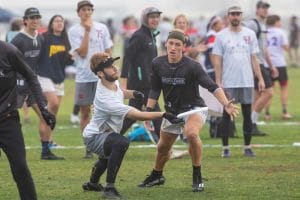
Adam Rees (San Francisco Revolver)
There were plenty of sources of sweet water in the green valley that was Revolver’s 2023 rejuvenation. A gentle brook of positive team culture here, a cloudburst of collegiate talent all falling about the Bay, a few smooth veterans lingering like Muir Woods fog. But the wellspring at the heart of it was the play of Adam Rees. All he did was absorb every team’s ace defender every offensive point of every game and still come out looking like the best all-around player on the field. Between the splendor of his highlights and the consistency of his effort – Rees’ point-to-point motor was positively artesian – he kept the Revolver offense fruitful and lush.
-Edward Stephens
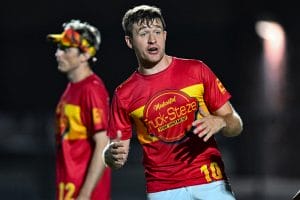
Tyler Monroe (Washington DC Truck Stop)
This makes it three straight seasons of All-Club honors for TyMon. If you liked what you saw in 2022 from the Truck Stop cutter you were in for a treat, as it was more of the same in 2023: powerful cuts and feathery throws. At times it looked like Monroe was playing full field goalty, zipping around in unpredictable ways, using his size and strength to box out defenders, and pinging creative bendy throws into unexpected places. On an O-line full of small ball wizards, Monroe brought a needed physicality and grit without sacrificing any of the throwing ability that made DC’s offense the best in the country.
-Patrick Stegemoeller
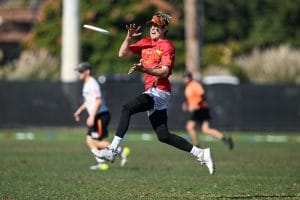
Rowan McDonnell (Washington DC Truck Stop)
If you were wondering if Rowan still has it — well, now you know the answer. He is a perfect fit for this year’s Truck Stop offense, leading the team in assists and executing on difficult shots. Playing as a hybrid this year, he did well finding his targets in advantageous spaces to get the offense in motion. It was vintage McDonnell at Nationals, spinning some serious silk that most throwers couldn’t dream of hitting. That technical capability and his clutch playmaking were key parts of DC’s title run.
-Jake Thorne
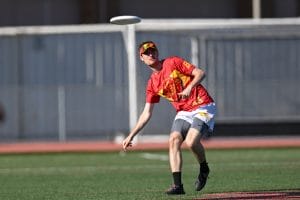
Jonny Malks (Washington DC Truck Stop)
If you listen to Rowan McDonnell, Truck Stop’s O-line owes its tactical renovation to sprightly Jonny Malks and the offense he brought up from William & Mary. If you squint, DC’s whirling dervish offense looks like the best two guys on a college team just throwing to each other through tight windows and improvisational cuts, except it is all seven guys on the line doing it. Malks scaled up Truck’s offensive approach to this odd equilibrium of delirious complexity and supreme simplicity: cuts and throws are coming from everywhere all the time, but ultimately they are just finding open hands wherever they appear. As the embodiment of that equilibrium Malks had the best season of his career, creating chaos and confusion for defenses by doing the simplest thing: throwing completion after completion after completion (and catching a few long balls, too).
-Patrick Stegemoeller
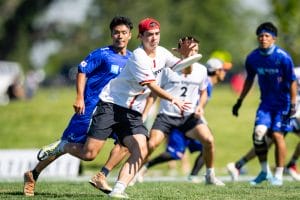
Mac Hecht (Boston DiG)
Hecht performing this well in the center handler position as travel player demonstrates how much of a hooper he really is. He led the division in assists (tied with Raphy Hayes) despite playing a game or two less than the rest of the field. If you think you can guard him, you probably can’t. He continues to baffle defenders with his tricky handler cutting patterns and is one of the most potent deep throwers in the game. His confidence guiding an offense and attacking the mark is bolstered by the skill and field vision that has defined backfield greats throughout the years.
-Jake Thorne
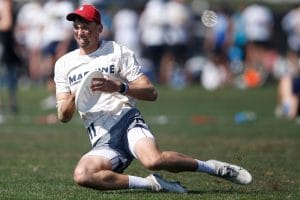
Nate Goff (Chicago Machine)
As it turns out, all Machine’s O-line needed was a little Goff. A unit that had been a bit herky-jerky for a couple of seasons suddenly, in 2023, gained a second true pillar to pair with Joe White. The instant you saw them get to work together, trading places as the shot in the trebuchet that was the Machine lane-attack offense, it was as obvious as beans and rice. Opening up a deep throwing game to rival his well-documented domination as a receiver and giving his team the luxury of the game’s most versatile crossover defender, Goff’s excellence encompassed every facet of the game.
-Edward Stephens

Quinn Finer (Denver Johnny Brav0)
A solid-if-unspectacular statistical performance from Finer at Nationals (5G, 7A) fails to capture his importance to Johnny Bravo’s offense as Finer was often tasked with some of the heaviest lifts: getting open in the lane against the other team’s fiercest defender, juicing the offense with continue throws, and being a safety valve when things break down. Moreover, focusing just on Nationals fails to capture his importance to Johnny Bravo all season, as he was the team’s rock all summer while other stars got healthy in time for their thrilling semifinal run in San Diego. Finer was the engine in Bravo’s rocket, keeping the team moving through it all.
-Patrick Stegemoeller